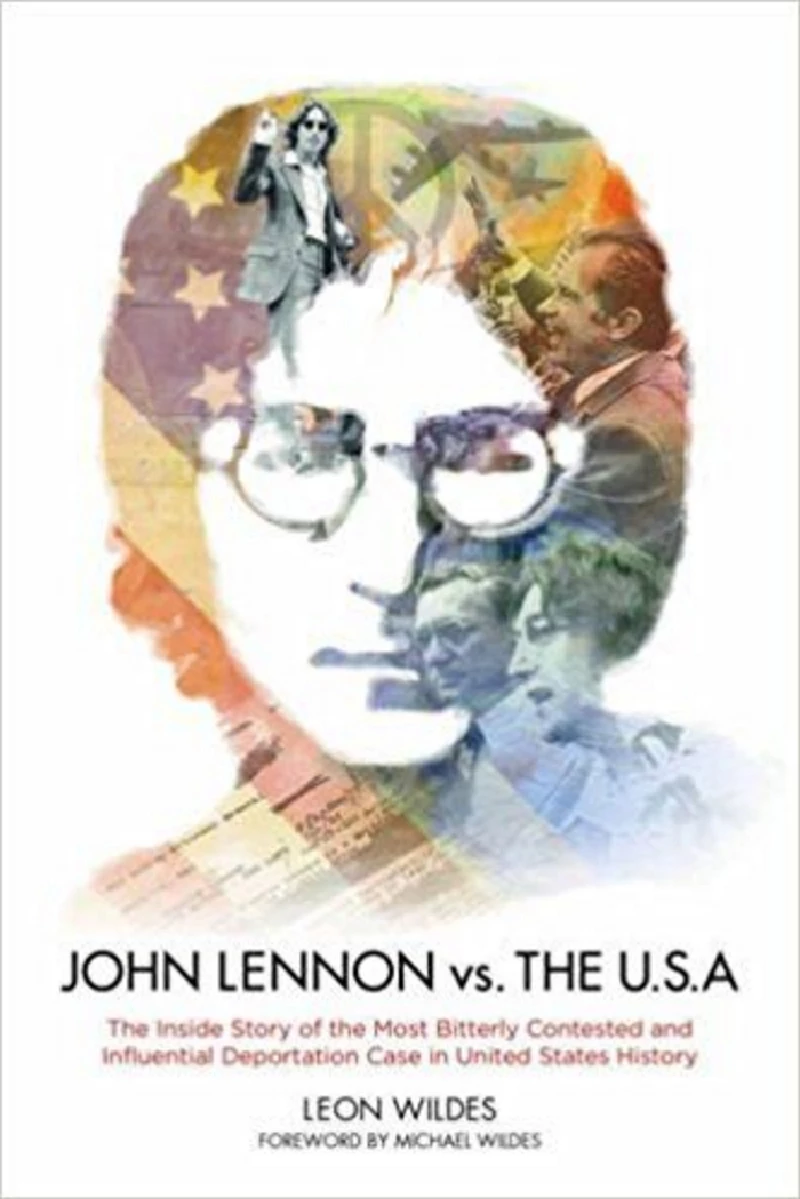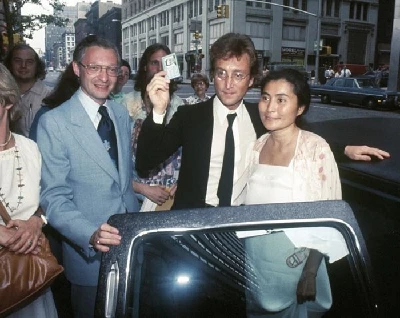Leon Wildes - Raging Pages
by Lisa Torem
published: 31 / 10 / 2017

intro
Immigration attorney Leon Wildes won the infamous John Lennon vs. The USA deportation case, allowing Lennon and Yoko Ono to remain in New York City. Lisa Torem in 'Raging Pages' examines his book, 'John Lennon vs. the USA', highlights the drama and its aftermath.
Michael Wildes begins this book’s foreword with the following statement by John Lennon: “You can have your father back now.” Leon Wildes, author, deeply respected immigration attorney and coveted speaker, spent five long years on John Lennon’s legendary deportation proceedings, which began during the reign of American president Richard Nixon. Lennon’s anti-war activities had signalled a red flag in the White House: the voting age for Americans had been lowered to 18, and Nixon felt threatened by the former Beatle's popularity with the youth culture. Additionally, Lennon had been associating with radicals, the likes of Jerry Rubin and Abbie Hoffman, and had performed at a benefit in Ann Arbor, Michigan on behalf of John Sinclair, who had received an unjust jail sentence for the possession of marijuana. It was during that benefit concert that Ono realized the FBI were there, documenting Lennon’s allegedly subversive lyrics. Wildes, a round-the-clock professional, had heard of The Beatles, but knew very little about John Lennon, and even less about Yoko Ono. In fact, he humorously recounts the night he came home and told his wife, Ruth, about his initial meeting with “Jack Lemmon and Yoko Moto”. That said, Wildes had his work cut out for him after that point. Yoko had her own challenges: she needed to remain in the U.S. to determine the whereabouts of her daughter, Kyoko, as her ex-husband Tony Cox had run off with the child after Ono and Lennon had got together. Lennon had pleaded guilty to the possession of drugs back in the U.K. following the advice of his then-lawyer. He explained to Wildes that he had been innocent of these charges, but had been the victim of a drug raid. “The drug squad at Scotland Yard was out to get rock musicians, and I was on their list,” he confided. Whilst Wildes at first felt that Lennon and Ono’s issues could be ironed out by their own counsel, he soon realized the magnitude of this time-sensitive case. Without immediate help, Lennon’s deportation proceedings would have begun within weeks; Wildes had to aggressively unearth detailed information, which the government wanted to hold back. He does an excellent job of describing the drama which ensued as the couple struggled to deal with being followed, having their phones tapped and wondering about the outcome of this difficult case. Lennon revealed: “I felt followed everywhere by government agents. Every time I picked up my phone, there was a lot of noise.” The pressure was undeniable. He continued: “They were harassing me. I’d open the door, and there would be guys standing on the other side of the street.” Wildes gives many more examples of the anxiety the couple endured, and how it impacted their marriage. Of course, the majority of books about musicians are written from the standpoint of the musician, the ghost writer or other person actively involved in the scene. That said, few are written from the standpoint of a legal professional. Fortunately, however, the legal terminology is broken down so effectively that the average person can make total sense of it. In fact, part of the satisfaction comes from learning about the complications and how Wildes patiently, but assertively, tackled each obstacle. Furthermore, the reader sees a side of the famous couple that seldom gets seen. Wildes develops a great deal of respect for both artists. He admires Lennon for treating Yoko’s child as his own. He appreciates the man’s wit, sense of justice and the way he urges Wildes to document unjust practices even after his own case gets resolved. When the story deals with the birth of their son, Sean, and Wildes makes a visit to the hospital, he recognizes that Yoko comprehends every nuance of the complicated legal documents he reads. As the story progresses, the flow of paperwork mounts. The appendix features important documents from the case, which include letters of support from celebrities such as Dick Cavett and Fred Astaire, letters from the INS (Immigration and Naturalization Service) and memos from state senators. This portion of the book really ties together much of the linear narrative. Although Raging Pages agrees that this book is educational and pop culture-friendly, its most haunting aspect is its relevance. As citizens and government entities continue to quarrel about the rights of immigrants throughout the world and how status should be determined, 'John Lennon vs. the USA' serves as an essential beacon of light and a model for posterity.
profiles |
|
Interview (2017) |

|
| Leon Wildes, author of 'John Lennon vs the USA', immigration attorney and winner of this groundbreaking case, talks about working with Lennon and Yoko Ono, legal challenges and the effects on posterity. |
most viewed articles
current edition
Carl Ewens - David Bowie 1964 to 1982 On Track: Every Album, Every SongArmory Show - Interview with Richard Jobson
Colin Blunstone - Thalia Hall, Chicago, 16/7/2025
Bathers - Photoscapes 1
Visor Fest - Valencia, Spain, 26/9/2025...27/9/2025
John McKay - Interview
Billie Eilish - O2 Arena, London, 10/7/2025
Robert Forster - Interview
Sir Tim Rice - Interview
Loft - Interview
previous editions
Heavenly - P.U.N.K. Girl EPManic Street Preachers - (Gig of a Lifetime) Millennium Stadium, Cardiff, December 1999
Oasis - Oasis, Earl's Court, London, 1995
Beautiful South - Ten Songs That Made Me Love...
Pixies - Ten Songs That Made Me Love...
Paul Clerehugh - Interview
Trudie Myerscough-Harris - Interview
Prolapse - Interview
Doris Brendel - Interview
Donovan - Ten Songs That Made Me Love...
most viewed reviews
current edition
Phew, Erika Kobayashi,, Dieter Moebius - Radium GirlsAmy Macdonald - Is This What You've Been Waiting For?
Sick Man of Europe - The Sick Man of Europe
Davey Woodward - Mumbo in the Jumbo
Cynthia Erivo - I Forgive You
Lucy Spraggan - Other Sides of the Moon
Bush - I Beat Loneliness
Alice Cooper - The Revenge of Alice Cooper
Blueboy - 2
Suzanne Vega - Flying With Angels
Pennyblackmusic Regular Contributors
Adrian Janes
Amanda J. Window
Andrew Twambley
Anthony Dhanendran
Benjamin Howarth
Cila Warncke
Daniel Cressey
Darren Aston
Dastardly
Dave Goodwin
Denzil Watson
Dominic B. Simpson
Eoghan Lyng
Fiona Hutchings
Harry Sherriff
Helen Tipping
Jamie Rowland
John Clarkson
Julie Cruickshank
Kimberly Bright
Lisa Torem
Maarten Schiethart